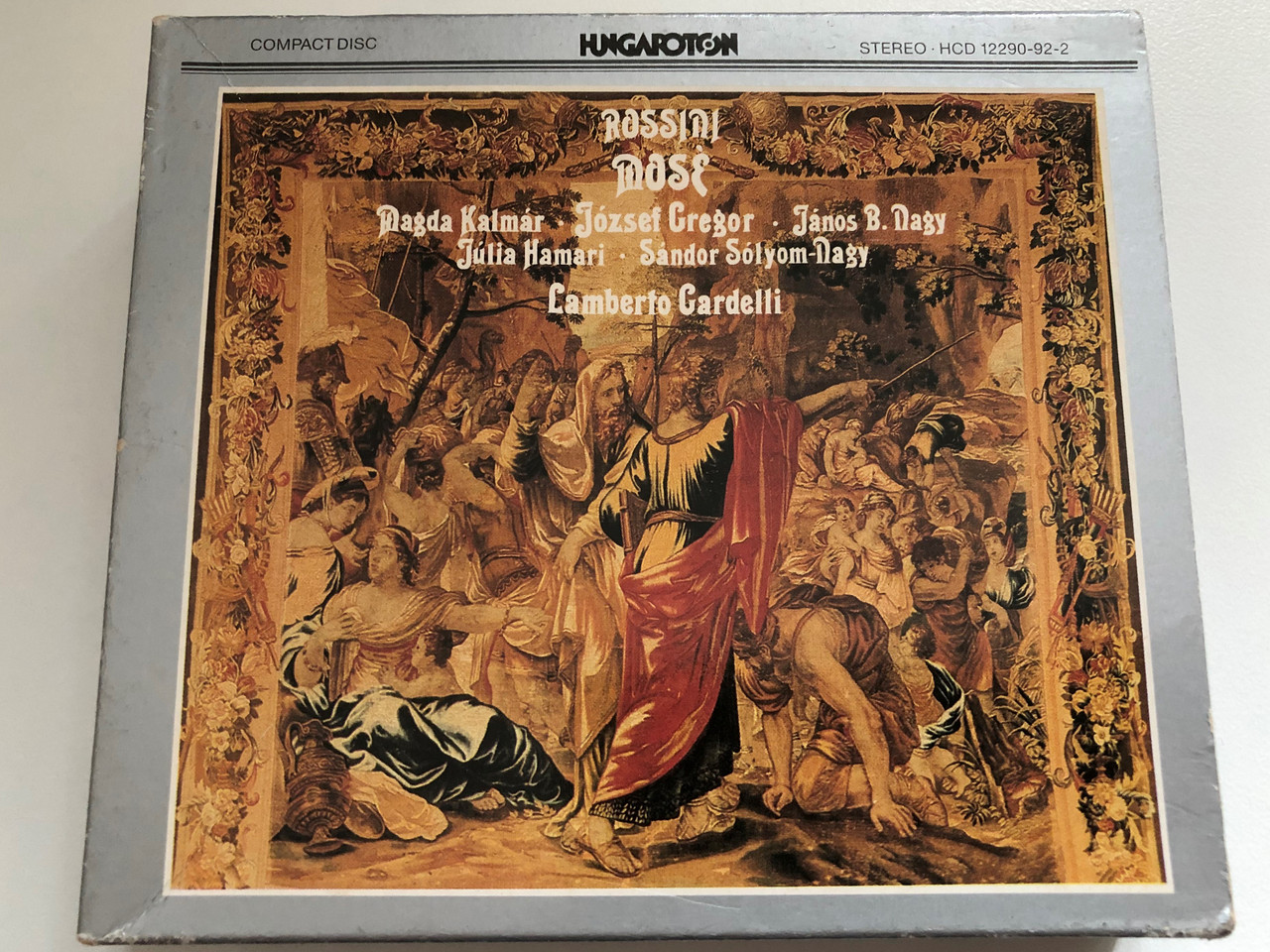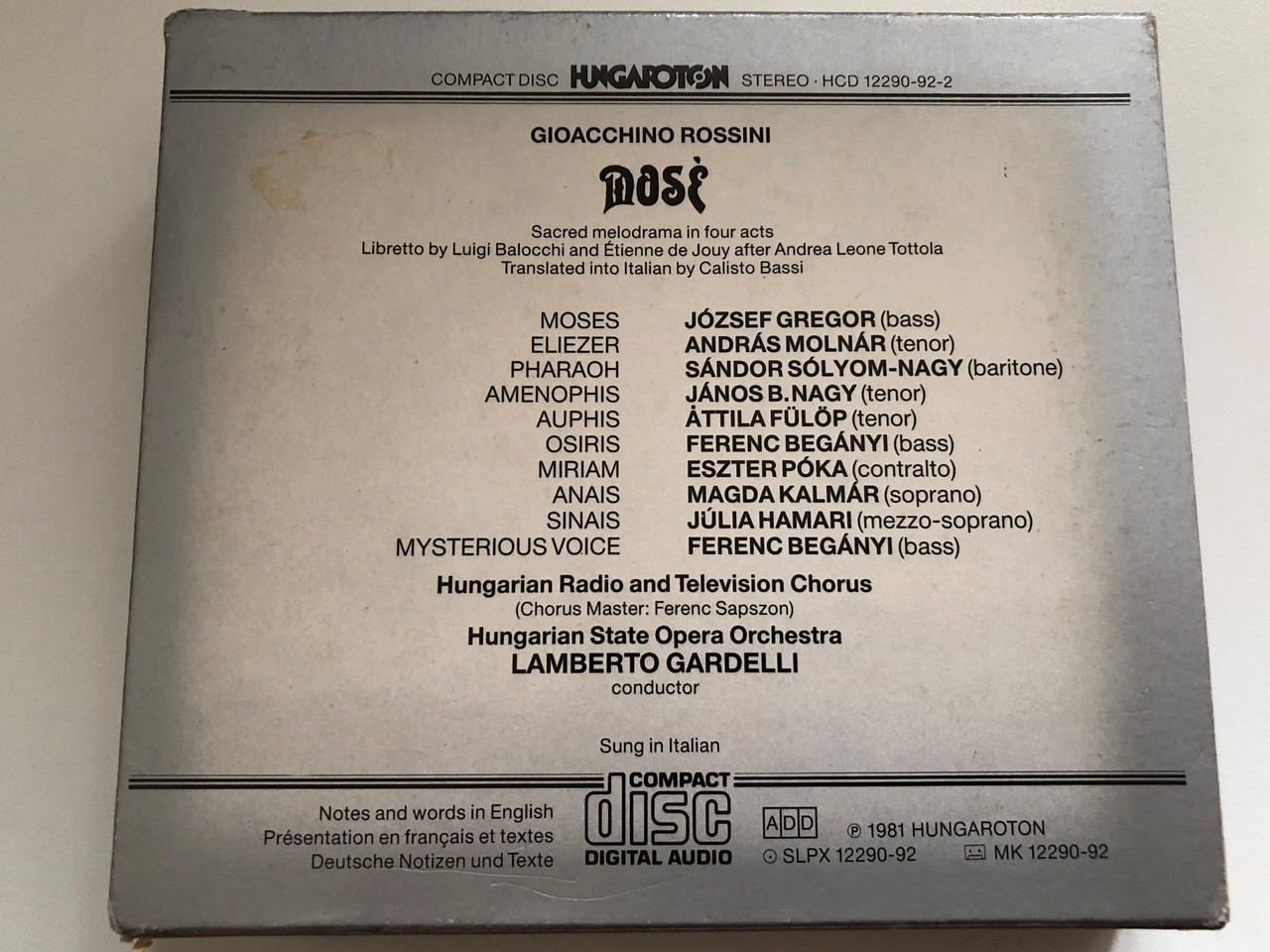Description
Rossini: Mosè - Magda Kalmár, József Gregor, Janos B. Nagy, Julia Hamari, Sándor Sólyom-Nagy, Lamberto Gardelli / Hungaroton 3x Audio CD, Box Set 1981 Stereo / 1986
HCD 12290-92-2
!!! Condition of this CD set is USED VERY GOOD !!! RARE!!!
Közreműködők:
Magyar Állami Operaház Zenekara / Magyar Rádió Énekkara (Hungarian Radio Choir) / B. Nagy János / Begányi Ferenc / Fülöp Attila / Gardelli Lamberto / Gregor József / Hamari Júlia / Kalmár Magda / Molnár András / Póka Eszter / Sólyom-Nagy Sándor
3 CD / A felvétel 1981-ben készült
| Label: | Hungaroton – HCD 12290-92-2 |
|---|---|
| Format: |
3 x CD, Box Set
|
| Country: | Europe |
| Released: |
1981 |
| Genre: | Classical |
| Style: | Romantic, Opera, Classical |
Tracklist:
| Mosè In Egitto, Opera | |||
| 1-1 | Preludio | 2:38 | |
|
Act One |
|||
| 1-2 | Introduzione | 1:41 | |
| 1-3 | Scena I: Ah Dell'empio Al Potere Feroce | 1:52 | |
| 1-4 | Scena II: Cessi Omai Dolor Cotanto | 4:03 | |
| 1-5 | Recitativo: Impaziente Pel Ritorno Io Sono - Scena III: Gloria Al Signor! |
5:41 | |
| 1-6 | Mosé, T'Accosta | 2:24 | |
| 1-7 | Quartetto: Dio Possente In Pace | 3:09 | |
| 1-8 | [Coro]: La Dolce Aurora | 3:02 | |
| 1-9 | Recitativo: Cadran, Cadran Quest'Oggi | 1:20 | |
| 1-10 | Scena IV: Recitativo: Dio, Che Vegli Su Me | 3:15 | |
| 1-11 | Duetto: Ah, Se Puoi Così Lasciarmi | 2:51 | |
| 1-12 | Non È Ver Che Stringe Il Cielo | 2:27 | |
| 1-13 | Ah! Qual Suon! | 3:18 | |
| 1-14 | Recitativo: Per Comando Del Re | 1:00 | |
| 1-15 | Finale Primo: Scena V: [Marcia E Coro] All'etra, Al Ciel | 3:36 | |
| 1-16 | [Duettino] Tutto Sorride Intorno | 4:54 | |
| 1-17 | Scena VI: Che Narri? - Scena VII: Fermate Audici | 2:23 | |
| 1-18 | All'idea Di Tanto Accesso | 4:40 | |
| 1-19 | [Stretta] Cielo, Qual Turbine! | 2:07 | |
|
Act Two |
|||
| 2-1 | Scena I: Introduzione - Terzetto: Ah! Chi Ne Aita? | 8:06 | |
| 2-2 | Scena II: Recitativo: La Voce Tua Mi Chiama | 2:32 | |
| 2-3 | [Invocazione] Eterno! Immenso! | 2:10 | |
| 2-4 | [Quintetto] Celeste Man Placata! | 4:26 | |
| 2-5 | Egizii! Faraone! | 1:43 | |
| 2-6 | Voci Di Giubilo | 3:16 | |
| 2-7 | Scena IV: Recitativo: Qual Abisso Di Mali! | 2:36 | |
| 2-8 | Rondo Finale: Ah! D'Un Afflitta Il Duolo | 3:43 | |
| 2-9 | Ma, Tu Taci? ...Giusto Cielo! | 1:48 | |
| 2-10 | Ah! Calma Quell'ira | 3:47 | |
|
Act Three |
|||
| 2-11 | Marcia | 1:41 | |
| 2-12 | Scena I: Coro D'Introduzione: Oh, Tu Che Sei Del Ciel | 4:01 | |
| 2-13 | Recitativo: Divini Appoggi | 2:22 | |
| 2-14 | Scena II: Recitativo: La Tua Promessa | 2:23 | |
| 2-15 | Scena III: Finale Terzo: A Tristo Fin Ridotti | 3:27 | |
| 2-16 | Mi Manca La Voce | 4:46 | |
| 2-17 | [Stretta] Non, L'Ardor In Voi Manchi | 4:46 | |
|
Act Four |
|||
| 3-1 | Preludio | 3:22 | |
| 3-2 | Scena I: Recitativo: Dove Mi Guidi Tu? | 2:35 | |
| 3-3 | Duettino: Quale Assalto! Qual Cimento! | 4:04 | |
| 3-4 | Scena II: Gran Scena: È Questo, O Figli | 2:04 | |
| 3-5 | Rondo: Qual Orribile Sciagura! | 5:27 | |
| 3-6 | Io L'Amai, Per Te Spensi | 1:28 | |
| 3-7 | Recitativo: Udisti Il Suo Voler? | 0:55 | |
| 3-8 | Marcia | 0:58 | |
| 3-9 | Scena III: Recitativo: In Tal Momento Orribile | 0:53 | |
| 3-10 | Preghiera: Dal Tuo Stellato Soglio | 4:55 | |
| 3-11 | Finale Quarto: Qual Fragor! | 2:28 | |
| 3-12 | Scena Ultima: Dove Son Dessi? | 5:13 |
- Baritone Vocals [Pharoah] – Sándor Sólyom-Nagy
- Bass Vocals [Moses] – József Gregor
- Bass Vocals [Mysterious Voice] – Ferenc Begányi
- Chorus – Hungarian Radio And Television Chorus
- Chorus Master – Sapszon Ferenc
- Composed By – Gioacchino Rossini
- Conductor – Lamberto Gardelli
- Contralto Vocals [Miriam] – Eszter Póka
- Design – Miklós Juhász
- Engineer [Balance Engineer] – István Berényi
- Libretto By – Luigi Balocchi, Étienne De Jouy
- Liner Notes – Hézser Zoltán
- Mezzo-soprano Vocals [Sinais] – Júlia Hamari
- Orchestra – Hungarian State Opera Orchestra
- Producer [Recording Producer] – Zoltán Hézser
- Soprano Vocals [Anais] – Magda Kalmár
- Tenor Vocals [Amenophis] – János B. Nagy
- Tenor Vocals [Auphis] – Attila Fülöp
- Tenor Vocals [Eliezer] – András Molnár
- Text By – Andrea Leone Tottola
- Translated By ["Rough Translation" Of Libretto To English] – Mária Steiner
- Translated By [To Italian] – Calisto Bassi
Mosè in Egitto (Italian: [moˈzɛ in eˈdʒitto]; "Moses in Egypt") is a three-act opera written by Gioachino Rossini to an Italian libretto by Andrea Leone Tottola, which was based on a 1760 play by Francesco Ringhieri, L'Osiride. It premièred on 5 March 1818 at the recently reconstructed Teatro San Carlo in Naples, Italy.
In 1827 Rossini revised and greatly enlarged the work to a four-act French libretto: Moïse et Pharaon, ou Le passage de la Mer Rouge (pronounced [mɔ.iz e faʁaɔ̃ u lə pasaʒ d(ə) la mɛʁ ʁuʒ]; "Moses and Pharaoh, or The Crossing of the Red Sea"). This was written by Luigi Balocchi and Victor-Joseph Étienne de Jouy. The première took place in the Salle Le Peletier of the Paris Opera on 26 March that year.
Riccardo Muti and many scholars consider Moïse et Pharaon, along with Guillaume Tell, to be among Rossini's greatest achievements!
Act 1
Darkness envelopes Egypt. It has been brought about by God in order to punish the Pharaoh and his people because he has failed to allow the Hebrews to leave the country for the Promised Land across the Red Sea. Moses is brought in and the Pharaoh declares that, when the sun shines again, he will release the captives. Cautioned by his brother Aaron not to believe the Egyptian leader, nevertheless Moses pleads to God and light returns.
However, because the Pharaoh's son Osiride is in love with the Hebrew girl Elcia and does not want to see her leave with her people, he persuades the High Priest, Mambre, to help him. The Priest does not believe in Moses' powers and he agrees to find a way to prevent the exodus by encouraging the Egyptians to revolt against allowing the Hebrews to depart. The Pharaoh then withdraws his promise and warns Moses that any Hebrew who tries to escape will be killed. Amaltea, Pharaoh's wife, has secretly converted and she tries to intervene, but to no avail. Moses then threatens further punishment and is set upon by Osiride's soldiers, intent upon killing him, but Pharaoh arrives in time to prevent it. Moses then prays for fire to rain down upon the country.
Act 2
Pharaoh orders the Hebrews to leave at once, so as to avoid the curse placed on his people. Then, telling his son that he has negotiated a treaty whereby Osiride will be married to the Princess of Armenia, he does not understand why his son hears his announcement with little enthusiasm.
Shortly afterwards, Moses learns that Osiride has kidnapped Elcia, but Aaron knows where they are hiding. Amaltea is warned and accompanies him to find the lovers.
Together in the cave, Osiride tells Elcia of his father's plans for him and he suggests that they can live together in hiding in the countryside. The Queen with her guards and Aaron interrupt the two lovers, but they refuse to separate and Osiris declares that he intends to give up the throne.
Meanwhile, the Pharaoh once again reverses himself and states that he will not allow the captives to leave, fearing that the Hebrews will support Egypt's enemies. Outraged, Moses declares that the Crown Prince and all the firstborn males of the country will be hit by a divine lightning strike. Pharaoh orders Moses to be put in chains, and, to protect his son from the prophecy, declares Osiride to be his co-ruler and that he will be the one to proclaim the death sentence on Moses. Elcia then comes forward revealing her relationship with Osiride and begging him to free Moses and his people. She tries to persuade him to accept his destiny and marry the royal princess of Armenia. But Osiride remains adamant and immediately orders that Moses be killed. As he does so, he falls dead from being struck by a bolt of lightning.
Act 3
On the shores of the Red Sea
Having crossed the desert, the Hebrews arrive on the shores of the Red Sea, but find themselves unable to continue their journey to the Promised Land. Leading his people and telling them to wait for God's action, Moses prays. As the advancing Egyptians appear, the Hebrews are panicking, but Moses touches the waters with his staff and the Red Sea opens to provide a pathway to the opposite shore. Following closely behind, the Egyptians, led by Mambre and Pharaoh, enter the gap in the waters but they are swamped by the waves which close over them.
Instrumentation:
The score calls for: 2 flutes/2 piccolos, 2 oboes, 2 clarinets, 2 bassoons, 4 horns, 2 trumpets, 3 trombones, serpent, timpani, bass drum, cymbals, triangle, Banda Turca, harp, strings.
Stage band: piccolo, quartino, 4 clarinets, 2 horns, 4 trumpets, 2 trombones, serpent, bass drum





















































